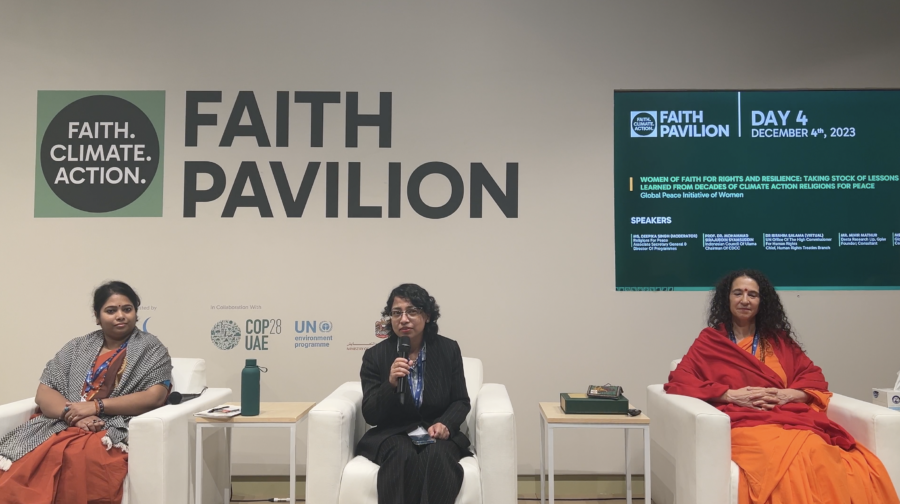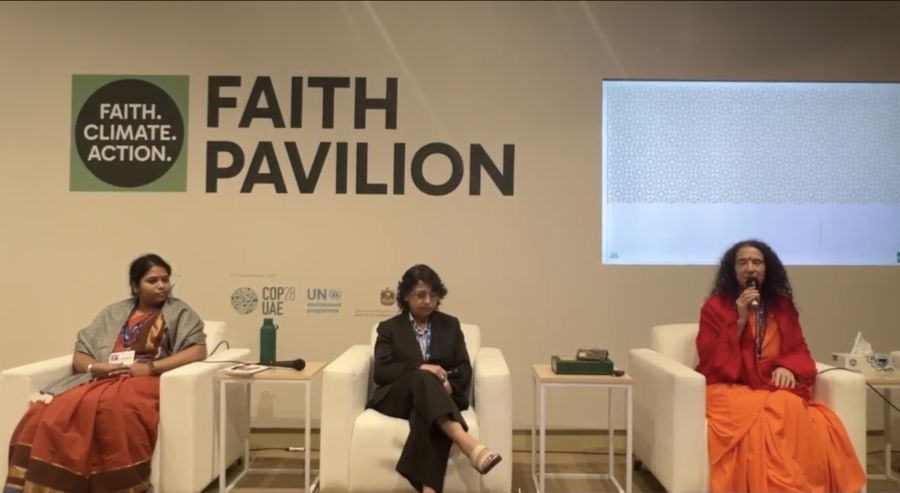Women of Faith for Rights and Resilience – Connecting Indigenous Voices to the Climate Conversation
“…times when there should be water, there is no water. Water being the source of life and livelihood for our communities, lack of it leads to poverty. When there is poverty, what you end up with, in already vulnerable communities, is early child marriage. Families who have young girls, well it’s just too expensive to feed another mouth… if she’s being kept at home she’s certainly not being sent to school, she’s being put to work begging or working in the fields.” – Dr. Sadhvi Bhagawati Saraswati, Co-President, Religions for Peace, Secretary General of Global Interfaith WASH Alliance.
Ordinary community members may not have access to the information and big data that analyses the cause and effect of climate change, but they certainly feel it. “Why don’t we have water when we should?” asks Amali, a subsistence farmer in the tropical climate regions in Eastern Africa. Amila is actually asking herself, as she adjusts her 18-month-old baby on her back and continues ploughing the hard soil on the small piece of land behind her house. This is her kitchen garden, where she grows traditional vegetables, spices and beans.
No one will answer Amila! She is unaware that COP28 is convening. During her last church women’s fellowship meeting, she heard that a huge group of people from the government, including their local Member of Parliament and the president, travelled to Dubai for a meeting about the ‘weather.’ Her church group patron is the wife of the Member of Parliament, and she was planning to travel to Dubai with her husband to discuss the ‘weather’.
“Perhaps when they come back, they will tell us why the rains have failed to come on time,” she wonders to herself. “But, why do they have to travel to Dubai to discuss rain that we need here at home?” Her contemplation is quickly distracted by the sight of a small anthill that has emerged in her small farm. She will have to look for pesticides or paraffin to pour into the holes and cracks on the farm or her farm preparation efforts will be futile.
Amila heads back to her house to wait to share the news of the anthill with her husband, who is due home in a few hours. She knows he will not have money for the pesticide. The rains failed and they received very little for their maize crops. Her prospects of growing vegetables and spices are diminished by each thought of the many obstacles she faces.
On 4 December, Religions for Peace, and the Global Peace Initiative of Women (GPIW), in collaboration with the United States Institute of Peace (USIP), the University for Peace (UPEACE), and the Office of the United Nations High Commissioner for Human Rights (OHCHR), was pleased to organise Women of Faith for Rights and Resilience: Taking Stock of Progress and Lessons Learned from Decades of Climate Action, at the 28th United Nations Conference of the Parties (COP28). The event focused on the critical role of women of faith, particularly Indigenous women and those in rural areas like Amila, and women leaders protecting the world’s remaining rainforests, while exploring the intersectionality of women of faith, climate and human rights. This hybrid event featured remarks by prominent speakers followed by a film screening of Guardians of the Rainforest and an interactive panel discussion on the multi-religious and multi-stakeholder Faith4Rights approach to climate advocacy and action.

In her opening remarks, Ms. Deepika Singh, Associate Secretary General and Director of Programmes, Religions for Peace, recalled that Indigenous women are disproportionately affected by climate change, often threatening their rights. At the same time, women of faith act as agents of change to protect and preserve the planet and people. Ms. Singh reiterated the crucial role women of faith leaders play in advocating for the protection of the environment while bringing about positive, transformative, global change.
When asked about her experience of how women of faith and their rights are disproportionately affected by the climate crisis and what can be done to mitigate and reverse it, Dr. Sadhvi Bhagawati Saraswati, Co-President, Religions for Peace; Secretary General of Global Interfaith WASH Alliance, explained her observation of the way in which women in the Himalayas are experiencing diminishing resources, making their roles in the home much more difficult. Dr. Sadhvi also explained how climate crisis-induced economic hardships are leading to a rise in gender-based violence and illustrated the intersectionality of climate and women’s issues by explaining the effects of climate change on child marriages.

On the occasion, Dr. Ibrahim Salama, Chief of the Human Rights Treaties Branch at the Office of the United Nations High Commissioner for Human Rights, elaborated on Faith for Rights Approach to the climate crisis and issues related to human rights and the distinct realities of diverse women of faith, including Indigenous women, across the globe.
Religions for Peace mobilises community and congregational women of faith networks to bring the voices, experiences, and community knowledge and assets of women such as Amila to the conversation. Their insights and resourcefulness are key inputs to the ongoing negotiations and conversations on climate change and its effects. They feel it as they are on the frontlines of these effects and their meaningful engagement especially through sharing best practices and alternatives is important and needs recognition.
The Guardians of the Rainforest film captures such voices and experiences and invites us into the communities where women like Amila are doing significant work in their communities, inspired and mobilised by the calling from their faith to care for environment and creation. Our hope is that the film will generate alternative narratives on the role of faith and particularly community and congregational women leaders in providing practical solutions to the multiple effects and dimensions of the climate crisis.
For more information on the Guardians of the Rainforest Film, kindly contact Ms. Kristine Leonardo, Programme Associate for the Multi-Religious Humanitarian Fund, Gender, and the Environment, Religions for Peace(kleonardo@rfp.org) with copy to Ms. Sohaa Khan, Media and Communications Specialist, Religions for Peace(skhan@rfp.org).